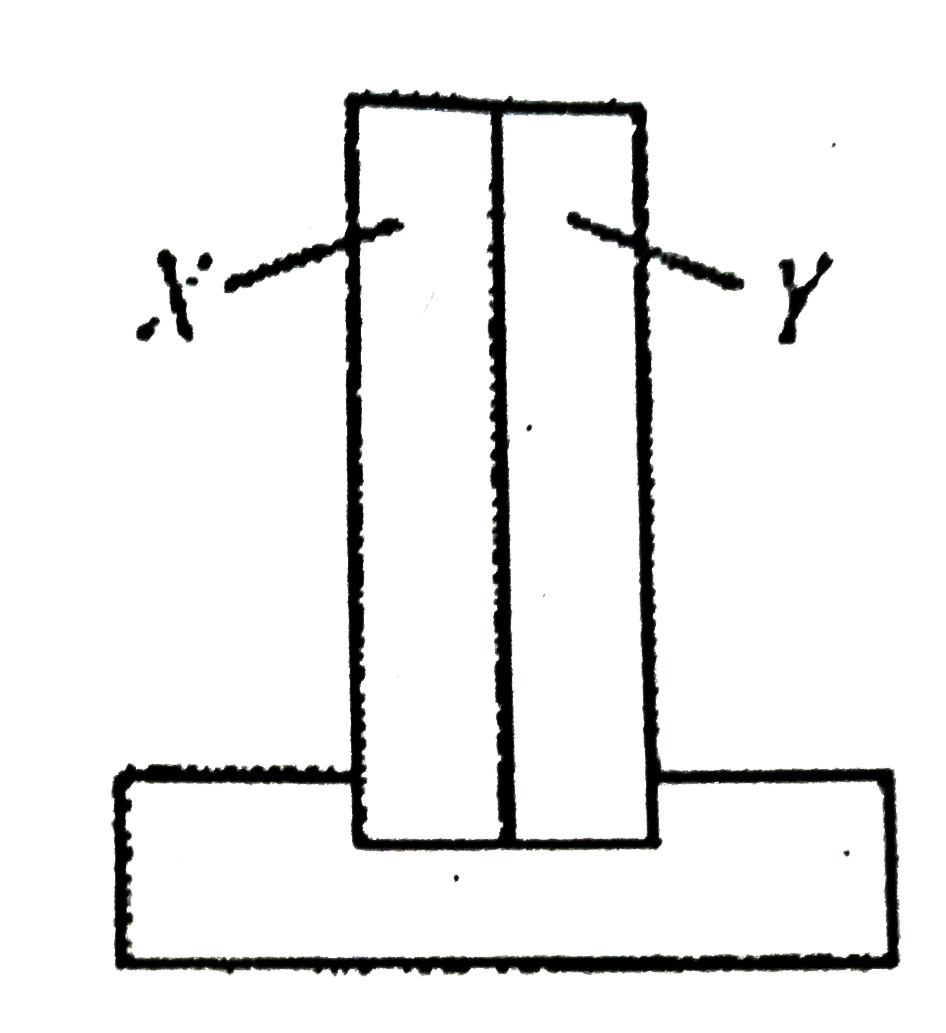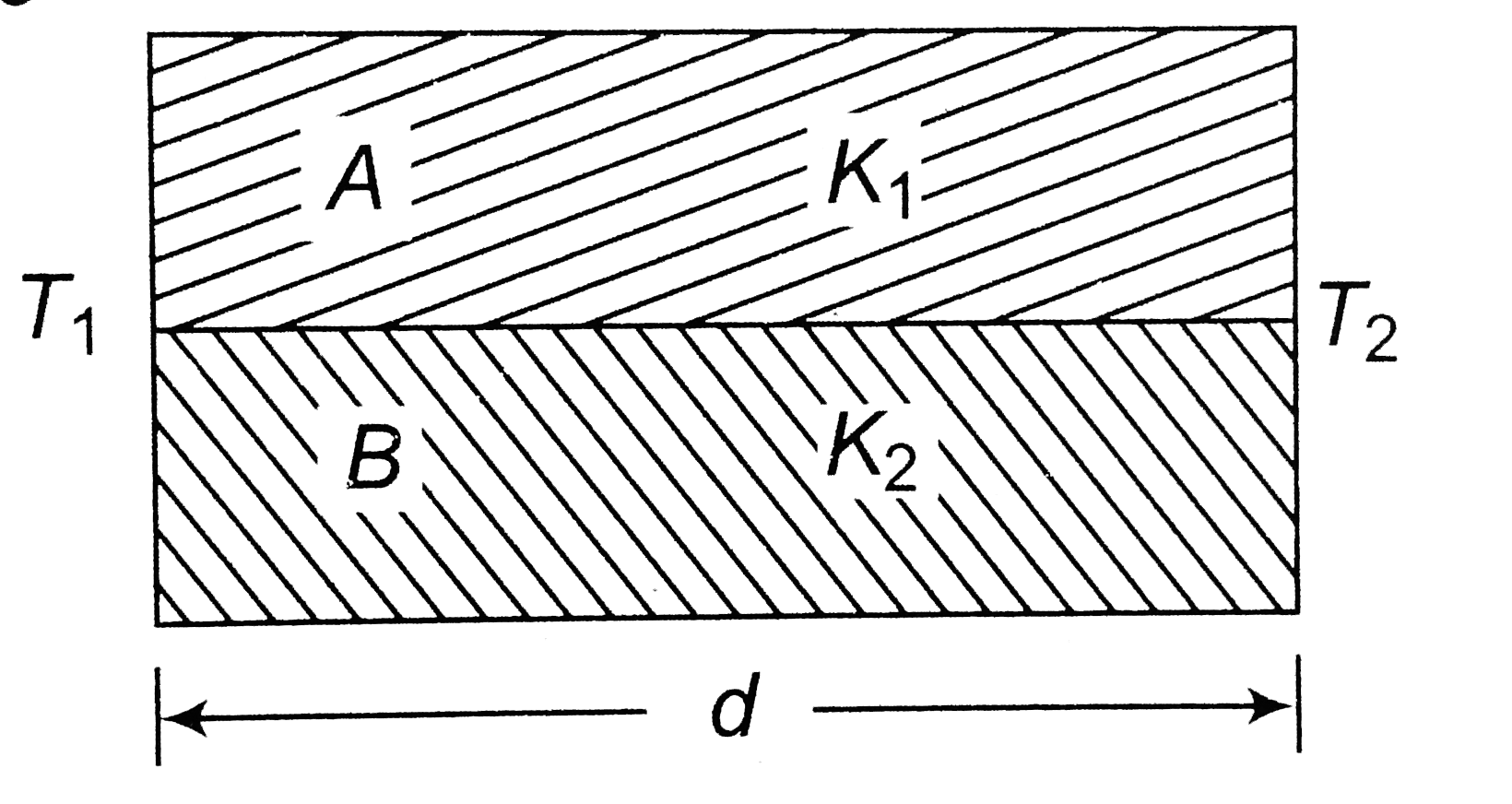Complete Solutions to COMPETITION FILE (OBJECTIVE TYPE QUESTION ((B) MULTIPLE CHOICE QUESTION FROM CPMPETITIVE EXAMINATION ) AIMPMT/NEET AND OTHER STATE BOARDS FOR MEDICAL ENTRANCE) of chapter THERMAL PROPERTIES OF MATTER of Class 11 book with complete answers and questions
| Class 11 | PHYSICS |
| Chapter | THERMAL PROPERTIES OF MATTER |
| MODERN PUBLICATION | COMPETITION FILE (OBJECTIVE TYPE QUESTION ((B) MULTIPLE CHOICE QUESTION FROM CPMPETITIVE EXAMINATION ) AIMPMT/NEET AND OTHER STATE BOARDS FOR MEDICAL ENTRANCE) |
| Number Of Questions | 18 |
| Academic Year | 2023-24 |
A bimetallic strip consists of metals X and Y. It mounted rigidly at the base as shown. The metal X has a higher coefficient of expansion compared to that for metal Y. When the bimetallic strip is placed in a cold bath

View SolutionA black body is at `727^(@)C`. It emits energy at a rate which is proportional to
View SolutionThe power radiated by a black body is P and it radiates maximum energy at wavelength, `lambda_(0)`. If the temperature of the black body is now changed so that it radiates maximum energy at wavelength `(3)/(4)lambda_(0)`, the power radiated by it becomes nP. The value of n is
View SolutionOn a new scale of temperature (which is linear) and called the `W` scale. The freezing and boiling points of water are `39^(@)W` and `239^(@)W` respectively. What will be the temperature on the new scale, corresponding to a temperature of `39^(@)C` on the Celsius scale?
View SolutionA deep rectangular pond of surface area A, containing water (density = `rho` ), specific heat capacity = s), is located in a region where the outside air temperature is at a steady value of `-26^@C` . The thickness of the frozen ice layer in this pond, at a certain instant is x. Taking the thermal conductivity of ice as K, and its specific latent heat of fusion as L, the rate of increase of the thickness of ice layer, at this instant, would be given by
View SolutionA black body at `227^(@)C` radiates heat at the rate of `7 cal cm^(-2) s^(-1)`. At a temperature of `727^(@)C`, the rate of heat radiated in the same unit will be
View SolutionThe total radiant energy per unit area, normal to the direction of incidence, received at a distance `R` from the centre of a star of radius `r` whose outer surface radiates as a black body at a temperature `T K` is given by
(where `sigma` is Stefan's constant)
View Solution1 g of water, of volume `1 cm^3` at `100^@C` , is converted into steam at same temperature under normal atmospheric pressure ` (= 1 xx 10^5 Pa)` . The volume of steam formed equals `1671 cm^3` . If the specific latent heat of vaporisation of water is 2256 J/g, the change in internal energy is
View SolutionA slab of stone of area of `0.36 m^(2)` and thickness `0.1 m` is exposed on the lower surface to steam at `100^(@)C`. A block of ice at `0^(@)C` rests on the upper surface of the slab. In one hour `4.8 kg` of ice is melted. The thermal conductivity of slab is
(Given latent heat of fusion of ice `= 3.63 xx 10^(5) J kg^(-1)`)
View SolutionLiquid oxygen at `50 K` is heated to `300 K` at constant pressure of `1 atm`. The rate of heating is constant. Which of the following graphs represents the variation of temperature with time?
View SolutionIf the radius of a star is `R` and it acts as a black body, what would b the temperature of the star, in which the rate of energy production is `Q`?
View SolutionA piece of iron is heated in a flame. It first becomes dull red then becomes reddish yellow and finally turns to white hot. The correct explanation for the above observation is possible by using.
View SolutionStream at `100^(@)C` is passed into 20 g of water at `10^(@)C`. When water acquires a temperature of `80^(@)C`, the mass of water present will be [Take specific heat of water `=1 cal g^(-1) .^(@)C^(-1)` and latent heat of steam `=540 cal g^(-1)`]
View SolutionAn object kept in a large room having air temperature of `25^@C` takes 12 minutes to cool from `80^@C` to `70^@C` . The time taken to cool for the same object from `70^@C` to `60^@C` would be nearly,
View SolutionThe two ends of a metal rod are maintained at temperature `100^(@)C` and `110^(@)C`. The rate of heat flow in the rod is found to be `4.0 J//s`. If the ends are maintained at temperature s `200^(@)C` and `210^(@)C`. The rate of heat flow will be
View SolutionA black body is at a temperature of `5760 K`. The energy of radiation emitted by the body at wavelength `250 nm` is `U_(1)` at wavelength `500 nm` is `U_(2)` and that at `1000 nm` is `U_(3)`. Wien's consant, `b = 2.88 xx 10^(6) nmK`. Which of the following is correct?
View SolutionTwo rods `A` and `B` of different materials are welded together as shown in figure. Their thermal conductivities are `K_(1)` and `K_(2)`. The thermal conductivity of the composite rod will be

View SolutionCoefficient of linear expansion of brass and steel rods are `alpha_(1)` and `alpha_(2)`. Length of brass and steel rods are `l_(1)` and `l_(2)` respectively. If `(l_(2) - l_(1))` is maintained same at all temperature, which one of the following relations holds good?
View Solution
COMPETITION FILE (OBJECTIVE TYPE QUESTION ((B) MULTIPLE CHOICE QUESTION FROM CPMPETITIVE EXAMINATION ) AIMPMT/NEET AND OTHER STATE BOARDS FOR MEDICAL ENTRANCE) questions and complete solutions for chapter THERMAL PROPERTIES OF MATTER of MODERN PUBLISHERS PHYSICS (HINGLISH) of Class 11
All Exercises from MODERN PUBLICATION Class 11 PHYSICS THERMAL PROPERTIES OF MATTER
- CHAPTER PRACTICE TEST
- COMPETITION FILE (ASSERTION REASON TYPE QUESTION )
- COMPETITION FILE (EXEMPLAR PROBLEM OBJECTIVE TYPE QUESTION (MULTIPLE CHOICE QUESTION TYPE - I )
- COMPETITION FILE (EXEMPLAR PROBLEM OBJECTIVE TYPE QUESTION (MULTIPLE CHOICE QUESTION TYPE - II )
- COMPETITION FILE (EXEMPLAR PROBLEM SUBJECTIVE QUESTION (SHORT ANSWER TYPE QUESTION)
- COMPETITION FILE (EXEMPLAR PROBLEM SUBJECTIVE QUESTION (VERY SHORT ANSWER TYPE QUESTION)
- COMPETITION FILE (INTEGER TYPE QUESTION )
- COMPETITION FILE (MATRIX MATCH TYPE QUESTION )
- COMPETITION FILE (OBJECTIVE TYPE QUESTION ((A) MULTIPLE CHOICE QUESTION WITH ONLY ONE CORRECT ANSWER))
- COMPETITION FILE (OBJECTIVE TYPE QUESTION ((B) MULTIPLE CHOICE QUESTION FROM CPMPETITIVE EXAMINATION ) AIMPMT/NEET AND OTHER STATE BOARDS FOR MEDICAL ENTRANCE)
- COMPETITION FILE (OBJECTIVE TYPE QUESTION ((B) MULTIPLE CHOICE QUESTION FROM CPMPETITIVE EXAMINATION ) JEE ADVANCED FOR IIT ENTRANCE )
- COMPETITION FILE (OBJECTIVE TYPE QUESTION ((B) MULTIPLE CHOICE QUESTION FROM CPMPETITIVE EXAMINATION ) JEE MAIN AND OTHER STATE BOARDS FOR ENGINEERING ENTRANCE)
- COMPETITION FILE (OBJECTIVE TYPE QUESTION ((C ) MULTIPLE CHOICE QUESTION WITH MORE THAN ONE CORRECT ANSWER)
- COMPETITION FILE (OBJECTIVE TYPE QUESTION ((D ) MULTIPLE CHOICE QUESTION BASED ON A GIVEN PASSAGE/COMPREHENSION )
- CONCEPTUAL QUESTIONS
- HIGH ORDER THINKING SKILLS AND ADVANCED LEVEL
- NCERT FILE (TEXTBOOK EXERCISE)
- PRACTICE PROBLEM
- REVISION EXERCISE (ADDITIONAL QUESTION)
- REVISION EXERCISE (FILL IN THE BLANKS)
- REVISION EXERCISE (LONG ANSWER QUESTION)
- REVISION EXERCISE (NUMERICAL PROBLEM)
- REVISION EXERCISE (SHORT ANSWER QUESTION)
- REVISION EXERCISE (VERY SHORT ANSWER QUESTION)
- SOLVED EXAMPLE
- TOUGH AND TRICKY PROBLEM